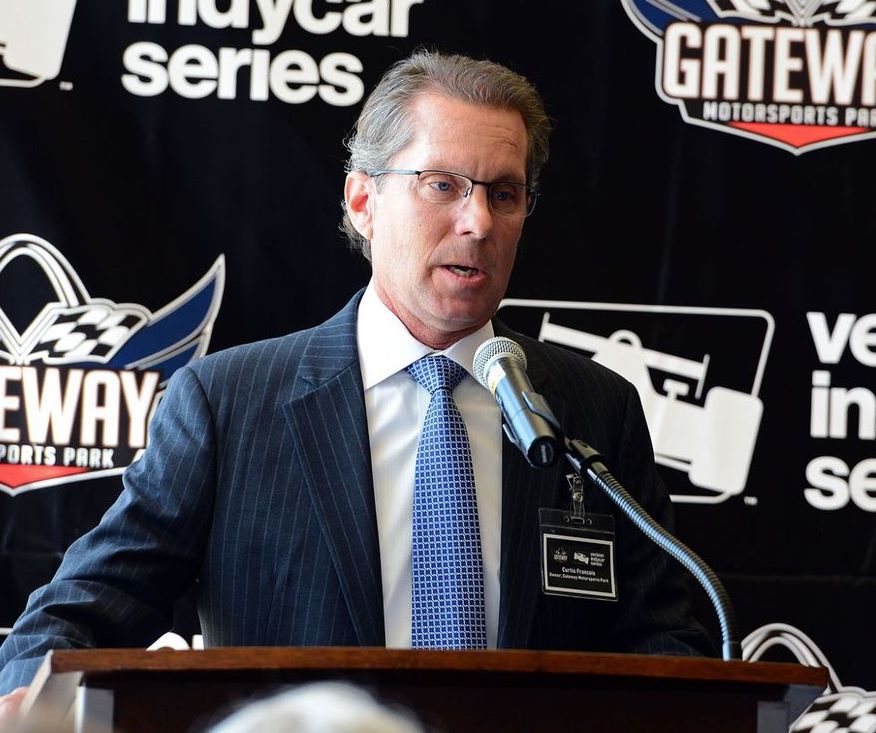With IndyCar race next, Gateway track is on pace to meet goals
 |
| Curtis Francois |
Curtis Francois' tour of the racing facility in Madison started on foot as he initiated his inspection of the track and its abundance of accompanying buildings in 2011 writes Stu Durando of the St. Louis Post-Dispatch.
Eventually he would switch to a golf cart and then a truck to reach the 48 buildings on 340 acres. Even with expedited means of transportation, Francois needed five days to complete a task that would ultimately lead to his purchase of Gateway Motorsports Park.
"I walked through every piece of this track, familiarizing myself with the different aspects of the infrastructure," he said. "I assessed everything down to what the bathrooms looked like. My yellow legal pad was full."
The former Gateway International Raceway was two weeks shy of being sold for scrap to cover a tax debt when Francois entered the scene. After $25 million in upgrades the facility is busier than ever, preparing to host an IndyCar race next month and hoping to turn a profit for the first time in 2017.
A former competitive driver who raced at Gateway in its first year, Francois could not bear to think about the community losing the facility. He used his real estate background to secure the land and track, and Gateway now has more offerings for local drivers and fans than any time in its history.
"Without a buyer willing to take on the risk of ownership, the assets on the property would have been sold as scrap," Madison Mayor John Hamm said at the time. "Gateway MSP is a first-class asset to our region, and it would have been devastating to our community to lose something as valuable simply due to corporate restructuring and a poor economy."
Francois had the drag strip re-surfaced and all related amenities updated after the National Hot Rod Association agreed to hold an event at the track for 20 years. He added a Kartplex in the infield at the oval and a dirt track. And the final touches are now taking place on the re-paved oval.
Those major additions don't include the myriad improvements to other parts of Gateway. Now Francois needs to have a year that finishes in the black.
"We feel this will be the year, which is right according to the plan," he said. "I feel if we continue to lean into this investment, eventually it will pay off. It has to pay off at some point to support the facility. If I was doing this for self-enrichment or to make a living, I wouldn't do it. The goal has always been to make the track self-sustaining, and I'm not going to stop until I get there."
Francois has secured three big-time races — the NHRA, NASCAR Truck Series and IndyCar — as the annual linchpins for Gateway. But it is the racing community for which he wants to make the facility a long-term success.
He points to the local drivers who have tens or hundreds of thousands of dollars invested in cars as the crowd to which he is dedicated. Improvements at the track have been focused on making a better experience for the drivers — amateur and professional — and fans.
Gateway has more than 300 event days per year. The Kartplex helped to generate 30,000 new visitors in 2015. Francois continues to seek more races, but the addition of an IndyCar race Aug. 26 is one of the most significant achievements yet.
Francois and the facility endured 2½ years of scrutiny from the racing league before being awarded the race, which required a sanctioning fee. The Sports Business Journal reported that fee as being between $1 million and $2 million for a domestic race.
"As long as we're doing a good job, there are no expectations they'd want to leave a major city that supports their sport," Francois said. "IndyCar is a much more international group as far as racers and more affluent from a fan standpoint. It attracts a different type of sponsor. There's definitely more glamour to IndyCar."
Francois drove some open wheel cars during his competitive days but never suspected he would own a track. He moved into real estate investment and that experience paid off when he had to negotiate a deal for the facility, which he leased for the first year.
Phase 1 of the plan was to invest $15 million just to get running. The biggest chunk went to the drag strip track and stands, but there was also a matter of painting everything, digging up eight-foot weeds that were growing out of pavement and updating all aspects of the operation.
None of that would have ever happened if former NHRA president Tom Compton had not agreed to a 20-year commitment to hold an event at the track.
"The NHRA deal was foundational to me purchasing the track," Francois said. "I struck that deal and we did it on a handshake. Tom said, ‘You buy it and we'll bring you a national event.' Without that we had no way of projecting any real cash flow."
The track at Gateway was previously owned by Dover Motorsports, which leased the underlying grounds. Those grounds were divided into 14 parcels owned by seven people. After the track closed in 2010, Francois took over with a lease agreement in 2011, but he didn't see that working into the future because of the numerous owners.
Francois solved the real estate issue and became owner of the track in the spring of 2013. The plan he had drawn up on his legal pad during his week-long inspection of the track was already well underway. It has yet to slow down.
"We're almost exactly where we thought we'd be according to our goals," Francois said. "But how we went from point A to point B looks nothing like we thought it was going to be." Stu Durando St. Louis Post-Dispatch
